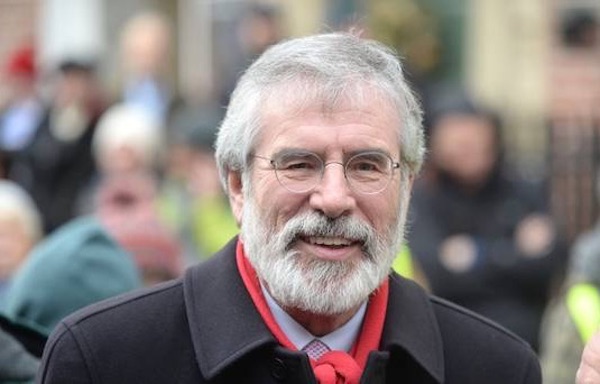
Former Sinn Féin leader Gerry Adams has called for greater planning and an accommodation with unionists ahead of a referendum on Irish unity which he says he is confident will take place.
Mr Adams said he believes a border poll will be held in the future, and called on the Dublin government to open up a consultation on unification.
“The debate about the future, about a new Ireland and the demand for a referendum on unity is growing,” he said. “Demographic and political changes in northern society are also playing an important role in encouraging this debate”.
Mr Adams pointed to recent elections in which the overall share of the vote for the main unionist parties fell significantly, falling by a fifth in the European elections. While the overall nationalist vote also fell slightly, it is still believed that nationalists will form the dominant community in future years.
The elections also showed increased support for Alliance, a ‘non-sectarian’ unionist party who ‘want Northern Ireland to work’, despite the sectarian nature of the statelet. The results show that Alliance has strengthened its claim to hold the balance of power within the Six County area.
Mr Adams said a plan now needs to be made to win the support of unionists for reunification in a Six County vote.
“This needs [to be] planned now. Not after the referendum. That is the one big lesson of Brexit. A referendum without a plan is stupid. So a referendum on unity must be set in a thoughtful inclusive process which sets out a programme of sustainable options, including phases of transition,” he wrote.
“What accommodations are needed to persuade political unionism that a united Ireland can work for it?”
He said the key to this to this is the need for “an agreed shared Ireland”.
“What happens to the political institutions established by the Good Friday agreement?” he asked.
“Winning support for a united Ireland is not just about persuading unionists although that is crucial. Everyone needs to be convinced of the advantages of unity – personal, economic, wages, health provision, environmental, cultural, peace, prosperity.”
He said there was a “constitutional imperative” to achieve a united Ireland. “There will be a referendum on Irish unity. I am confident of this. Winning that referendum is the biggest single challenge facing united Irelanders.”
Sinn Féin has come in for criticism over the past year for some vacillation and hand-wringing on a referendum, unlike the more forthright and determined approach to independence in Scotland. Party leader Mary Lou McDonald was forced to row back on a statement in August that a border poll should not take place in the context of Brexit and only with “maximum consent” from unionists. There was speculation that Mr Adams’s latest statement was deliberately held back to avoid impacting on the recent elections.
‘CONVERSATION’
SDLP leader Colum Eastwood took credit for the statement.
“I’m glad to hear that Sinn Féin is moving to the position that I have been outlining for some time. Their initial reaction to my suggestion that calling for a border poll with no plan or idea on how it would be delivered would be madness was entirely negative,” he said.
“Let the conversation that we’re about to have be based on what’s best for people. Let it be a cross-community conversation on a vision for the future that reflects where we are and where we want to be. That’s the challenge that lies ahead.”
Aontú Leader Peadar Tóibín said that it is vital that a ‘New Ireland Forum on Irish Unity’ is established. He called for practical planning to begin to map out a process of convergence, north and south.
“The Fine Gael government is out of step with the majority view in Ireland and is doomed to repeat the catastrophic mistakes of the Tories in London by refusing to plan for the inevitable,” he said.
Meanwhile, talks about restoring power-sharing have continued at Stormont. Speaking after meeting the two governments and party leaders, Sinn Féin’s Mary Lou McDonald called for a “radical step change” to resolve outstanding issues before the anti-Catholic marching season gets fully underway.
“An intensive, focussed and time-limited negotiation must now begin,” Ms McDonald said. “We have an opportunity but time is short. The next week is critical.
“People want an Executive and an Assembly that is sustainable, rights-based and which serves every citizen. That is a test of leadership. That is a test of political will. That’s what we want to achieve.”
![[Irish Republican News]](https://republican-news.org/graphics/title_gifs/rn.gif)
![[Irish Republican News]](https://republican-news.org/graphics/title_gifs/harp.gif)

